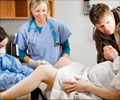
The detector, named CervoCheck, has been developed by Karin Hwang of Ontario, Deepika Sagaram of Philadelphia, Rose Huang of Brooklyn, N.Y and Chris Courville of Lafayette, La.
Current technology detects pre-term labour so late that medications can only delay the birth, but if labour can be detected early, these medications can prolong birth by 6 weeks or so, said Hwang.
The device contains a compressed ring that fits inside the vaginal canal. Accompanying sensors pick up electrical signals associated with uterine contractions.
"We estimate that the cost savings could be more than 44,000 dollars per patient for every preterm birth we could prevent," Hwang said.
"We're passionate about seeing this become a reality," she added.
Advertisement











